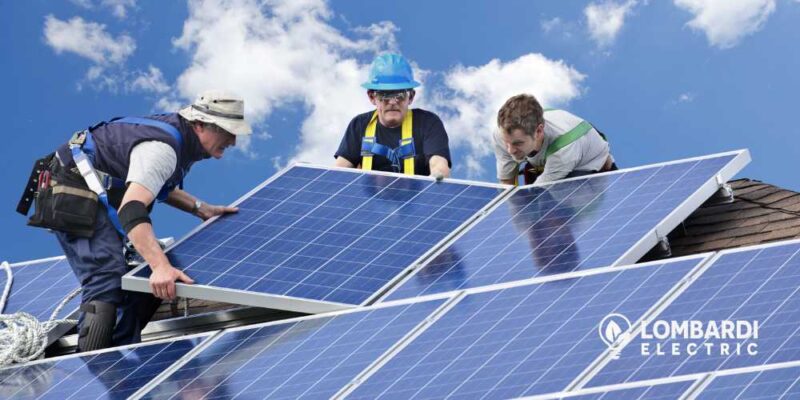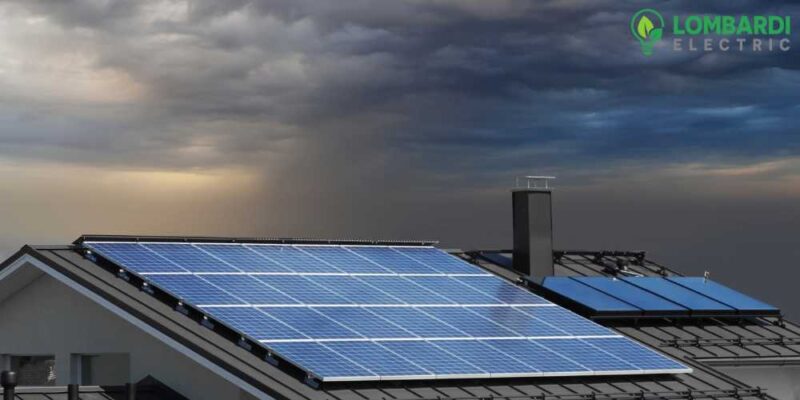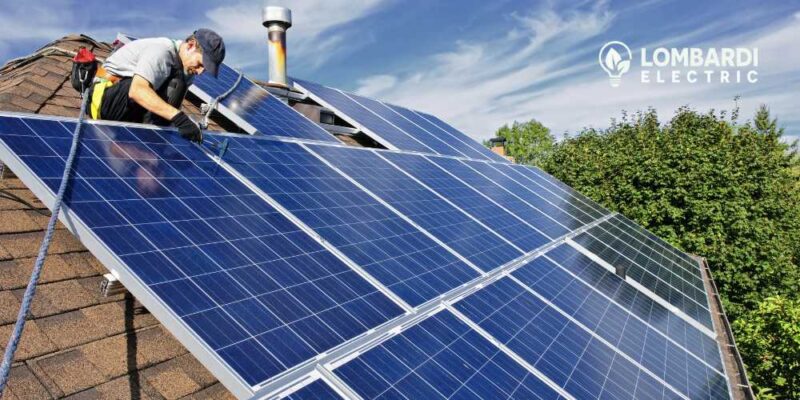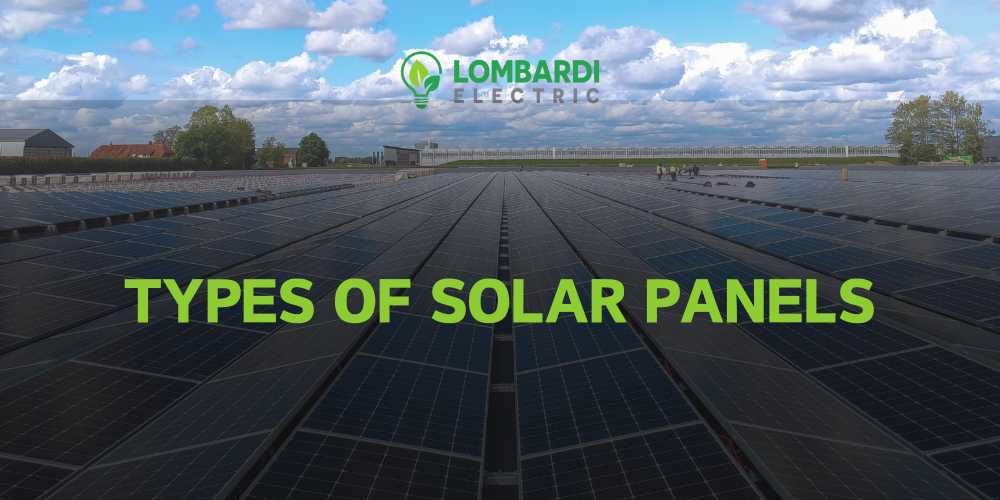What are the most common types of solar panels? If you’re considering switching to solar power, it’s crucial to understand the three types of solar panels and determine which type of solar panel suits your home best.
Lombardi Electric, your trusted partner for Alexandria residential electrical services, is your go-to source for solar panel sales, commercial and residential installations. With our expertise and commitment to customer satisfaction, we’re here to guide you through the process and help you embrace a greener, more sustainable future.
If you need a solar panel quote in Alexandria, are looking to buy solar panels in Alexandria, or just have questions related to adding solar panels to an existing solar system in Louisiana, call our Alexandria solar panel company at 318-545-7575 and take the first step towards harnessing the abundant sunshine in Louisiana for your energy needs.
What Are Solar Panels?
Before our Alexandria solar system installers delve into the specifics of the different types of solar panels, it’s essential to understand what solar panels are and how they function. Solar panels, also known as photovoltaic (PV) panels, capture sunlight and turn it into electricity.
Solar panels are composed of numerous solar cells typically made from semiconductor materials like silicon. When sunlight hits these solar cells, it excites electrons, creating an electric current.
Electricity produced by solar technology can be harnessed to power homes, businesses, and industrial facilities, reducing dependence on traditional energy sources and lowering the cost of electricity in Louisiana while also being environmentally friendly.
How Solar Panels Work

The basic functioning of solar panels involves a few key steps:
Absorption of Sunlight: Solar panels are designed to capture sunlight, composed of photons. These photons carry energy that is essential for the photovoltaic process.
Electron Excitation: When photons from the sunlight strike the solar cells, they excite electrons within the cells. This excitement generates an electric current.
Electricity Generation: The electric current produced is in direct current (DC) form. To make it usable for homes and businesses, it is converted into alternating current (AC) through an inverter.
Usage or Storage: The converted AC electricity can now power appliances, lighting, and other electrical devices within the premises. Any excess electricity can be stored in solar batteries for later use or sent back to the grid through a process known as net metering, earning credit from the utility company.
Now that we have a fundamental understanding of how solar panels work, let’s explore the three solar panel types: monocrystalline solar panels, polycrystalline solar panels, and thin-film solar panels.
Different Types of Solar Panels
There are three types of solar panels, each with advantages and disadvantages. Lombardi Electric is here to help Alexandria residents make the right choice for their specific needs.
Monocrystalline Solar Panels
Traditional monocrystalline panels are a type of photovoltaic panel known for their exceptional efficiency and durability. Monocrystalline solar panels are crafted from a single pure silicon crystal, carefully grown and cut into wafers. The single pure silicon crystal structure allows for a higher purity level, resulting in monocrystalline solar panels having a more efficient conversion of sunlight into electricity.
Monocrystalline silicon solar cells are recognized for their sleek appearance and space efficiency, making these black solar panels an excellent choice for those with limited installation space. With their long lifespan and impressive energy production capabilities, monocrystalline solar cells are a top choice for homeowners and businesses in Alexandria, Louisiana, looking to make a smart investment in renewable energy.
Benefits of Monocrystalline Panels
- Efficiency: Monocrystalline solar panels are known for high efficiency, which can convert more sunlight into electricity. This efficiency makes traditional monocrystalline panels an excellent choice for smaller residential installations.
- Space-Efficient: Monocrystalline cells are space-efficient, making them ideal for installations with limited roof or ground space.
- Durability: Monocrystalline solar panels are typically more durable and have a longer lifespan compared to other types of solar panels. Monocrystalline panels often have extended warranties, ensuring a reliable and long-term investment.
Disadvantages of Monocrystalline Panels
- Higher Cost: Monocrystalline solar panels are more expensive than other types of solar panels upfront. However, the higher energy efficiency and longer lifespan of traditional monocrystalline panels can offset this initial cost over time through increased energy production and reduced maintenance.
- Temperature Sensitivity: Monocrystalline cells may experience a slight drop in solar panel efficiency in extremely high temperatures, which can be a concern in Louisiana’s hot summers.
Polycrystalline Solar Panels
Polycrystalline solar panels are another popular choice in the solar industry. Polycrystalline panels are made from multiple silicon crystals, as opposed to the single crystal used in monocrystalline panels. The manufacturing process of polycrystalline solar panels involves melting raw silicon fragments and then casting those silicon fragments into square-shaped wafers.
While polycrystalline solar cells may not be as efficient as their monocrystalline panel counterparts, they offer a cost-effective alternative for homeowners and businesses in Alexandria, Louisiana.
Polycrystalline cells are recognized for their affordability and respectable energy conversion rates, making polycrystalline panels a practical choice for those with larger installation spaces and budget considerations. With their ability to generate clean and renewable electricity, polycrystalline solar panels contribute to a greener future while keeping your energy costs in check.
Advantages of Polycrystalline Panels
- Less Expensive: Polycrystalline solar panels are generally more affordable than the monocrystalline solar panel, making polycrystalline panels an attractive option for budget-conscious customers.
- Moderate Efficiency: While polycrystalline solar cells aren’t as efficient as monocrystalline panels, polycrystalline panels still offer respectable efficiency levels, making them a practical choice for residential applications.
Disadvantages of Polycrystalline Panels
- Larger Space Requirement: Polycrystalline solar panels are less space-efficient, meaning you may need a larger installation area to generate the same amount of electricity as monocrystalline panels.
- Lower Durability: Polycrystalline solar cells may have a slightly shorter lifespan than monocrystalline panels and require more frequent maintenance.
Lombardi Electric offers top-notch Alexandria solar panel maintenance and repairs if necessary.
Thin-Film Solar Panels
Thin-film solar panels represent a distinct category of photovoltaic technology. Unlike monocrystalline and polycrystalline panels that use solid silicon fragments, thin-film panels can be made from several materials.
The most common type of thin-film panel is made from cadmium telluride, which has the lowest carbon footprint. Thin-film solar panel manufacturing process places cadmium telluride or copper indium gallium selenide (CIGS panels) between the transparent conducting layers that help the thin layer capture sunlight. The thin film has a glass top covering the cadmium telluride or copper indium gallium selenide for additional protection. This thin layer allows for greater installation flexibility, making thin-film solar panels suitable for unconventional surfaces like curved roofs and portable applications.
Solar panel manufacturers can also make thin-film panels with amorphous silicon, similar to monocrystalline and polycrystalline panels.
While thin-film solar cells tend to be less efficient than crystalline solar panels, thin-film panels excel in versatility and cost-effectiveness. Homeowners and businesses in Alexandria, Louisiana, looking for flexibility in Alexandria solar panel installation and affordability often find that the thin-film solar panel tends to be an attractive option, harnessing solar power while adapting to their specific needs and locations.
Advantages of Thin Film Solar Panels
- Flexibility: Thin-film panels are often made out of amorphous silicon solar cells, so they are incredibly flexible and lightweight, making the thin-film panel suitable for unconventional installation surfaces like curved roofs or portable solar applications.
- Low Production Cost: The manufacturing process for thin-film panels is cost-effective, which can translate into lower upfront costs for customers looking to purchase thin-film panels
Disadvantages of Thin Film Solar Panels
- Lower Efficiency and Performance: Thin-film portable solar panels have lower efficiency than monocrystalline and polycrystalline panels, meaning more space is needed to generate the same amount of electricity when comparing one thin-film panel to one monocrystalline panel.
- Shorter Lifespan: Thin-film panels generally have a shorter lifespan than crystalline panels and may require replacement sooner.
- Lower Heat Tolerance: Thin-film panels have a lower heat tolerance than monocrystalline and polycrystalline panels.
Now that we have explored the advantages and disadvantages of each solar panel type, you may wonder which type is the best choice for your specific needs in Alexandria, LA.
Best Type of Solar Panel in Louisiana

The best type of solar panel for you depends on various factors, including your budget, available space, and energy efficiency requirements. Here are some considerations to help you decide which type of solar panel is best for your home.
Best Types of Solar Panels for Limited Installation Space
If you have limited roof space or ground space, monocrystalline panels may be the best option due to their high efficiency and space efficiency. However, if you have more roof space, polycrystalline panels can be cost-effective.
Best Type of Solar Panel for Shaded Areas
How the solar panel performs under different shading and temperature conditions is essential.
If your installation site is partially shaded, thin-film panels may be a suitable choice due to their flexibility and ability to handle shading conditions better than monocrystalline and polycrystalline panels. Solar panels near areas with treelines will need to be cleaned more regularly. Our professional solar power technicians show you how to clean solar panels, or our Alexandria solar cleaning company can maintain them for you.
Best Solar Panels for Low Solar Panel Costs
Solar panel costs will play a significant role in your solar panel decision. In terms of the best solar panels for solar panel costs, thin-film panels are generally the most affordable upfront, while monocrystalline solar panels may cost more initially but provide higher efficiency and durability, potentially offering better long-term value. However, there is a solar tax credit available to help offset those costs.
We dive into costs associated with solar panels here: how much do solar panels cost?
Best Solar Panels for Efficiency, Power Capacity, and Power Output
Regarding power capacity and output, monocrystalline solar panels stand out as the top choice among the three types of solar panels. These monocrystalline solar cells consistently demonstrate high solar panel efficiency, meaning they can convert more sunlight into electricity compared to polycrystalline solar panels and thin-film solar panels.
While monocrystalline and polycrystalline panels may come with a slightly higher upfront cost, the superior solar panel efficiency of monocrystalline solar panels often proves to be a worthwhile investment in the long run.
What Type of Solar Panel is Most Efficient?
Monocrystalline panels excel in providing more power output for the same installation space, making them an ideal option for homeowners and businesses in Alexandria, Louisiana, looking to maximize their power capacity, lower energy bills, and reduce their reliance on traditional energy sources.
Best Type of Solar Panel for Energy Storage
Consider whether you want to invest in energy storage solutions like solar batteries. Monocrystalline panels, with their higher efficiency, can make better use of stored energy compared to other solar panel types.
Lombardi Electric can assist you in assessing your specific needs and guiding you to the most suitable type of solar panel for your home or business.
Best Fire, Hurricane, and Hail Rating Solar Panels
In Louisiana, where scorching summers are the norm but occasional snowfall and the threat of tornadoes and hurricanes loom, solar panel types can be critical in withstanding severe weather conditions.
Monocrystalline solar cells are the most suitable option for such environmental challenges. The robust build and durability of mono panels make them well-equipped to handle adverse weather situations. With a track record of withstanding high temperatures and occasional snow loads, monocrystalline panels are an ideal choice for homeowners and businesses in Alexandria, Louisiana, who want to ensure their solar panels can weather the storm – quite literally.
There is no formal solar classification rating for hurricanes. However, the Department of Energy expanded design specifications to safeguard against the most severe weather.
If your location is prone to adverse weather, you’ll want to look for the following when considering solar panel types:
- High rating for wind and snow loading
- Fasteners that have true locking capabilities
- Through-bolting modules
- 3-frame rail solar system for support
- Fencing around the solar system
What Type of Solar Panel is Best for Louisiana Homes and Businesses

In addition to the type of solar panels, several other factors should be taken into account when making the switch to solar technology:
Financial Incentives: Explore available financial incentives, such as federal tax credits and local utility rebates, which can significantly reduce the overall cost of installing solar panels.
Installer Experience: Choose a reputable and experienced solar system installer like Lombardi Electric to ensure the installation is performed correctly and efficiently.
Warranty: Review the warranty offered by the solar installer and manufacturer. A longer warranty can provide peace of mind for the lifespan of your solar panels.
Maintenance: Consider the maintenance requirements of your chosen solar panel type and factor in any associated costs.
Energy Consumption: Analyze your current energy consumption and ensure your solar panel system is sized appropriately to meet your needs.
Net Metering: Check if your utility company offers net metering, allowing you to receive credits for excess electricity generated by your solar panels and fed back into the grid.
Environmental Impact: Embrace the benefits of solar energy, reducing your carbon footprint and contributing to a more sustainable future.
Solar Panels in Alexandria, LA
As the demand for clean and renewable energy sources grows in Louisiana, Lombardi Electric remains committed to providing top-notch electrical services, including Alexandria solar panel sales and services. Our team of experts is ready to assist you in choosing the best solar panel type and correct number of solar panels in Louisiana for your specific requirements and ensuring a seamless transition to solar panel technology.
With our vast experience and dedication to customer satisfaction, we’re a residential and commercial solar business in Alexandria that’s a trusted partner in harnessing the sun’s power and positively impacting both your energy bills and the environment. Contact us today at 318-545-7575 to learn more about our solar panels and start your journey towards a greener, more sustainable future in Alexandria, LA.
